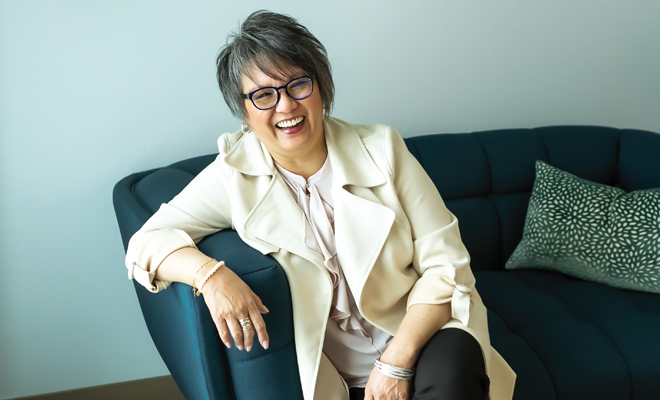 Ann Ishii Photography
Ann Ishii Photography
Suzanne Schultz: A Life of Service
Suzanne Schultz loves her job, a job that she has put her heart into for the past 38 years. After a long and dynamic career at the San Joaquin County District Attorney’s Office, she is retiring and having a difficult time saying goodbye. “I have to say, my work does bring me tremendous joy and I feel grateful that I found this work. I feel fulfilled from this work; that’s what makes it harder,” Suzanne explained.
From the time she was a little girl, Suzanne always wanted to be of service to the people around her. She wanted to find out what they needed and meet that need. When she was five, she thought she wanted to be a chef and open a restaurant. “I had the little kitchenette; I made menus and my menus had salami and cheese or ham and cheese roll-ups. Which is just exactly that; it was a piece of ham with a piece of American cheese and I would roll it up, put it in a pan and heat it up and then serve it in my restaurant. I wore an apron and I would wait on my little brother and my babysitter and welcome them to my restaurant. My restaurant was called, get this, The Fantastic!” Suzanne said with a flourish. “I always wanted to feed people and make them happy.”
Life Influences
When Suzanne was in junior high, her father lost his job. While Suzanne claims they were never affluent, she does remember them being comfortable before this upheaval. Her father didn’t have much practice in overcoming this type of adversity, and the shame of not being able to support his family tragically pulled him into a deep depression.
Suzanne began working when she was 15 years old at a local burger place. She paints a picture of not having a clear idea about what she wanted to do after high school. “I really remember being scared my senior year in high school because everybody else seemed to know what they were going to do, what they were going to major in at college. I had zero idea of what my interests were and what I excelled at,” Suzanne recalled.
Suzanne worked in that burger restaurant until she was 22, feeding anyone who walked through the door. At the insistence of her mother, Suzanne began searching for a job that would be more purposeful. She then took an entry-level job as a file clerk for the Municipal Court of San Joaquin County. One of the chief deputy district attorneys for the District Attorney’s Office recruited her in 1988 for a receptionist position at the 0ffice. “That was how I started my career here. I then started paying attention—I was fully present and tried to learn and understand the complexities of the criminal justice system,” she said thoughtfully, “And that, I think, was a benefit, too. I wanted to learn.”
Finding Vocation
During her three decades at the District Attorney’s Office, Suzanne worked in a myriad of roles, but none so impactful and rewarding as her time in the Family Crimes Unit. It was there Suzanne found her calling—helping people navigate the ever-shifting bureaucracy of the criminal justice system. The better she got, the more she was noticed and the more responsibilities she was given. In 2015, an opportunity presented itself. She, along with District Attorney Tori Verber Salazar, laid the foundation for the first Family Justice Center in our county. Suzanne found her true niche: helping, educating, advocating and improving the system for victims of domestic violence, child abuse, sexual assault, elder abuse, stalking and human trafficking.
This is harrowing work that needs to be done, but it has the unfortunate result of consuming the people who make it their job. Somehow, Suzanne has the perfect demeanor to have dodged that bullet. “God blessed me with tremendous empathy for my fellow human beings, but I also recognize this: that as human beings we have, for the most part, autonomy, and we make our choices. Sometimes our choices are going to be impacted by the trauma we experienced when we were little,” Suzanne explained. “I realized that people have the right, every single right, to live their lives and make the choices that they want to make. And maybe their choice is to stay with him, even though he punched her in the face. I had to realize that my job was to let these victims know their options so they could make the most informed decision possible. Ultimately, it’s their choice.” And she does her best to not take it personally.
Suzanne has won many awards for her impact and efforts to combat domestic violence in our community. In 2021, Suzanne received the Athena Leadership Award from the Greater Stockton Chamber of Commerce for her pivotal role in the establishment of the Family Justice Center. She describes the FJC as a shopping mall except that, instead of having all the most popular stores under one roof, it’s everything a survivor of one of these crimes needs to gather themselves, face the next day and do what they need to do to go from surviving to thriving.
Streamlining Support
Previously, women and children needing to press charges against abusers, find a bed in a shelter, get restraining orders, find safe childcare or use any of the services offered by the county, would have to go from office to office and building to building around the county. They would have to pay for parking in multiple locations or spend all day on public transit. Some had kids in tow and some reluctantly left them in less-than-safe places hoping to get through it quicker.
It is no secret that the interiors of court buildings can be labyrinthine and that it isn’t always clear to the layperson where they need to be. All of this unpleasantness can wear someone who is already close to breaking to the point that they just give up and go back to their abusers. It’s hard for someone who has never been in that situation to comprehend, but people can get used to most things and sometimes pain seems easier and more tolerable than the unknown because at least it’s familiar.
To prevent any inadvertent traumatization of survivors, the thought that went into the hiring and training for the staff at the Family Justice Center was very detailed and purpose driven. Every department knows what every other department does. For example, let’s say a young woman named Jane comes into the Joaquin County Family Justice Center with her two young children. There will be a safe place for her children to go while she talks to a victim’s advocate. None of the staff will pressure her into doing anything she doesn’t want to do, including pressing charges against her abusive boyfriend. There is an ongoing narrative among some public figures, procedural cop dramas and some talking heads that victims of sexual assault are somehow obligated to publicly denounce the men that preyed on them; that is not a luxury everyone has. Sometimes surviving is the best thing a trauma survivor can do. Suzanne understands and asserts that this is okay.
In this same building, Jane, a fictional survivor, can find the mental health services, be referred to a shelter, start working toward her high school diploma, take useful classes such as cooking, art therapy and group therapy, talk with a deputy district attorney if she chooses, obtain a restraining order, and every staff member knows there aren’t any abnormal reactions to unthinkable trauma. So, if someone isn’t acting “normal,” they try to help them cope with their hurt in a productive, healthy way; instead of jumping to conclusions, making accusations and maybe even sending her to jail or worse. If Jane uses the tools put in place for her and her children, she can start over and have a very bright future.
Suzanne’s Tomorrow
Suzanne had her hand in this effort from the beginning—helping the San Joaquin Family Justice Center come to fruition and overseeing its first few years—rather she is comfortable with where the FJC is in its development and knows it will continue to grow. She’s excited to get back to cooking for her husband and other family members, but most of all she’s excited about hitting the road in her motor home again.
“I don’t want to live my life in fear, right? My husband’s a bit older than I am. I’m 57 and my husband is 71. If God blesses us all with a long life, it’s highly likely that when I’m in my late 70s, 80s, whatever, I may be all by myself. I wanted to be independent. And so, once we got the motor home, I told my husband, ‘I drive the motor home. You sit in the passenger seat.’ I do all the driving,” Suzanne said emphatically.
“I want to know when I’m in my 70s or 80s, if I’m still riding around in the motor home, I don’t want to be afraid. So, I try to take charge. I go out to dinner all by myself once in a while. And I ask them not to sit me in a corner all by myself. No, I’ll take a table in the middle of the restaurant. Then I intentionally don’t pull my phone out. I don’t want to use it as a shield to try to comfort me. I try to be fully present and eat the meal and look at people and really engage. I want to be comfortable in my own skin because I just don’t want to live in fear. It’s a bad place to be. It just paralyzes you. I’ve done that before. I lived in fear when I was younger and it fills you with regret. I don’t want to do that,” she concluded.







